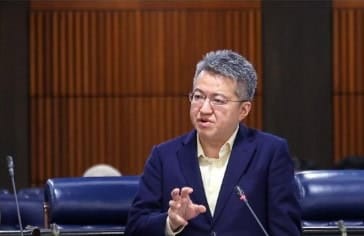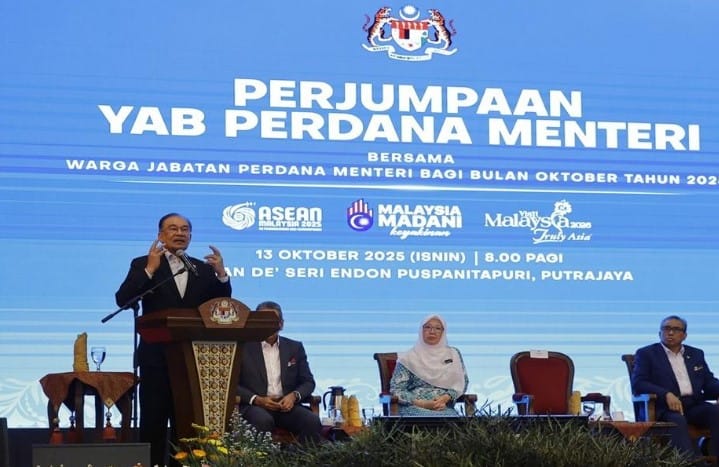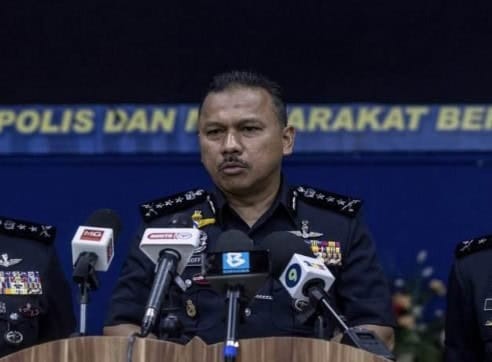
Senior Minister of International Trade and Industry Datuk Seri Azmin Ali with South Korea counterpart Yoo Myung-Hee
KUALA LUMPUR, April 21 — Malaysia and South Korea strive to strengthen the economy of Asia-Pacific region without neglecting the health and welfare of the people, said International Trade and Industry Minister Datuk Seri Mohamed Azmin Ali.
In a video conference with his South Korean counterpart Yoo Myung-Hee today, Mohamed Azmin said many important aspects were discussed, including the economy of the region, Regional Comprehensive Economic Partnership (RCEP) agreement, and COVID-19.
He said both countries agreed that while health considerations must remain paramount, economic vibrancy and protecting livelihoods of citizens were equally imperative.
“We shared notes on how our respective governments are dealing with the pandemic, as well as the economic consequences arising therefrom.
“We concurred that it (RCEP) is crucial for the region to move ahead with it sooner rather than later,” he said in a post on his Twitter account.

The RCEP is a regional agreement that aims to liberalise trade and investment, and to strengthen economic cooperation in Asia-Pacific economies.
Approved investments up 1.7 pct to RM208 bln in 2019 – MIDA
In another news, Malaysia attracted RM207.9 billion worth of approved investments in the manufacturing, services and primary sectors last year, up 1.7 per cent compared to 2018.
The Malaysian Investment Development Authority (MIDA) said domestic direct investment accounted for the bulk of the total approved investments — 60.4 per cent or RM125.5 billion.
Foreign direct investment (FDI), though only making up 39.6 per cent, recorded a 2.9 per cent growth to RM82.4 billion, MIDA said in a statement yesterday.
It said the services sector led the way for investments approved, which grew by 11.3 per cent from 2018. A total of 4,087 projects were approved, with investments valued at RM118.1 billion last year.
This was followed by the manufacturing sector with approved investments of RM82.7 billion and the primary sector at RM7 billion.
Three countries accounted for 66.3 per cent of total FDI approved in the manufacturing, services and primary sectors: the United States (US) (RM26.8 billion), China (RM15.7 billion) and Japan (RM12.1 billion).
Four states contributed more than 60 per cent of the total approved investments for 2019. They are Selangor (RM47.8 billion), Penang (RM33.7 billion), Johor (RM24.4 billion) and Kuala Lumpur (RM21.6 billion).
In the services sector, MIDA said the top five investment contributors were real estate (RM40.9 billion), utilities (RM32.6 billion), global establishments (RM11.8 billion), distributive trade (RM11.7 billion) and support services (RM5.7 billion).
For the manufacturing sector, the number of projects approved jumped 37 per cent to 988 projects from 721 projects in 2018.
FDI accounted for 65.2 per cent (RM53.9 billion) of total approved investments in this sector, while domestic investments constituted the remaining 34.8 per cent (RM28.8 billion).
On the sector’s top-performing industries in 2019, the agency said they were electrical and electronics (RM25.7 billion), paper, printing and publishing (RM10.8 billion), transport technology (RM8.0 billion), non-metallic mineral products (RM6.9 billion), and chemicals and chemical products (RM4.8 billion).
“It is noteworthy that investments in the three catalytic sub-sectors, namely electrical and electronics, machinery and equipment and chemical, and two high growth areas – aerospace and medical device – recorded an increase of 90.2 per cent to RM40.9 billion last year from RM21.5 billion in 2018,” MIDA said.
Both China (RM15.3 billion) and the US (RM14.2 billion) were the two top investor countries in the country’s manufacturing sector, contributing 54.7 per cent of the total foreign investments approved in the sector, it said.
MIDA also noted that Selangor (RM17 billion) was the largest recipient of investments in the manufacturing sector last year, followed by Penang (RM16.9 billion), Kedah (RM11.5 billion) and Johor (RM11.5 billion).
For the primary sector, investments approved slipped to RM7 billion from RM10.9 billion in 2018, with the mining sub-sector leading the bulk (94.3 per cent) of investments.
The rest of the investments were from the plantation and commodities sub-sector, and the agriculture sub-sector, which registered sustainable investments of RM291.4 million and RM135.1 million, respectively.
Senior Minister and Minister of International Trade and Industry (MITI), Datuk Seri Mohamed Azmin Ali, said while the COVID-19 pandemic has changed the global industrial system, MITI is committed to ensuring that Malaysia continues to be positioned as an investor-friendly location for long term growth of both foreign and domestic businesses.
“FDI is a long-term capital flow. We trust that the existing foreign companies will continue to weather the storm and retain their investment in the country.
“Malaysia kick-started this year with five approved manufacturing and services projects worth RM4.6 billion. The priority now is to bring in high value-added investments that can help to revive the economy,” he added.
He said as business as usual approach will no longer work in this challenging environment, a fundamental solution for the country to revitalise the economy is through adopting bold initiatives to ensure impactful accomplishments.
“Closer partnerships between federal, states and local authorities will be of the essence in facilitating our investors and ensuring the implementation of approved projects.
“All stakeholders need to make the necessary changes and re-engineer processes to deliver more efficient and effective services. Digitalisation and automation is indeed the way forward,” he said.





More Stories
Malaysia, Brazil Sign Memorandum To Cooperate In Semiconductor Sector – Liew
RM7.9 Billion For TVET To Enhance Local Skilled Talent Development
Timor-Leste To Be Made Full Member Of ASEAN On Oct 26 – PM Anwar